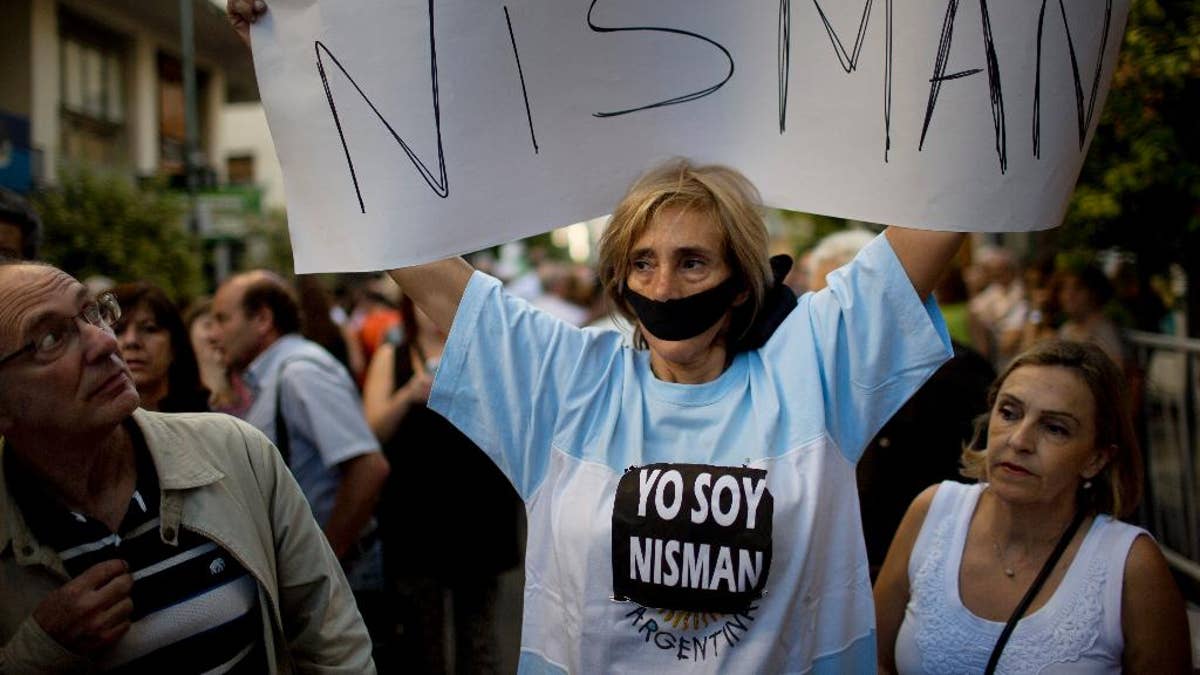
(The Associated Press)
"I can end up dead because of this" were the words of the late Alberto Nisman, Argentina's top prosecutor in the historic AMIA case. Tragically, his words became prophetic when he was found slain in the bathroom of his high-rise apartment in Buenos Aires, just one day before he was going to present his latest investigation against the Argentinian president, her foreign minister and Iran.
Many are not aware of Iran's presence and penetration in Latin America, but Dr. Nisman knew that the Iranian terrorists involved in Argentina’s 9-11 are still active in his country and throughout the region.
All these acts, or potential acts, of terrorism reveal a significant Iranian fingerprint and provide further evidence of Iran’s presence, power and reach in Latin America.
Recordings recently released by Argentinian journalists reveal Dr. Nisman’s wiretaps on an Iranian agent known as Alejandro “Yussuf” Khalil, who appears to be just one of several well-placed sources in Buenos Aires. According to Dr. Nisman, all these agents reported to an infamous Iranian cleric, Mohsen Rabbani, mastermind of the 1994 bombing of the AMIA Jewish center resulting in 85 deaths.
Since then, Rabbani has been involved in at least one other major terrorist plot in the Americas, recruiting a Guyanese parliamentarian, Abdul Kadir, to carry out an attack on JFK international airport in New York City. Thankfully, U.S. authorities uncovered this dangerous plot, arrested Kadir and his Caribbean counterparts in 2007, but Rabbani is still safe in Iran.
Nisman’s sudden death has provoked several U.S. lawmakers to examine Iran’s role in the region and discuss its lengthy history with political assassinations. The high profile political murders of opposition figures – such as Shahpour Bakhtiar, the last Iranian prime minister before the 1979 revolution, killed in his home in Paris – creates a calling card for Iran’s ability to reach out and touch its enemies anywhere in the world. In recent years, Iran enhanced this capability across the Atlantic, into the Americas.
In one relatively recent case, after revealing a cyber-plot against the U.S. hatched by Iranian and Venezuelan officials in Mexico, three Mexican whistleblowers were granted asylum and protection in Canada. The plot was exposed in a 2011 Spanish-language documentary broadcast by Univision.
The documentary played audio recordings of then-Iranian Ambassador to Mexico City, Mohammad Hassan Ghadiri, telling his Mexican recruits to access the servers of U.S. defense installations. Also on the call was then-Venezuelan consul in Miami, Livia Acosta, who was expelled from the U.S. after the documentary aired on TV.
After this Iranian-sponsored cyber-terrorist plot was exposed, one of the Mexican whistleblowers was infected with a highly unusual strain of Hepatitis C. According to Canadian court records, doctors suggested that his virus might have originated in a lab of one of the countries involved in the plot. The whistleblowers themselves testified that they were under continuous surveillance by Iranian intelligence after the documentary was televised—and at least one had received several death threats.
The evidence presented in this case was compelling and credible enough for the Canadian Immigration and Refugee Board to grant refugee protection to the Mexican whistleblowers, now living in British Columbia.
In another case, closer to home, U.S. authorities discovered in 2011 an Iranian-American car salesman, Manssor Arbabsiar, working with the feared Qods Force of the Iranian Revolutionary Guards to recruit a Mexican cartel to carry out a political assassination against the Saudi Ambassador in Washington D.C. While some questioned this case, there were two overseas wire transfers from a Qod’s Force operative, Golam Shakuri, that brought about a federal indictment on Abrabsiar, who is now serving 25 years in prison.
Nisman's death, the cyber-plot, and the attempt on the Saudi Ambassador’s life—all seem more like a spy novel than actual events. The reality is that all these acts, or potential acts, of terrorism reveal a significant Iranian fingerprint and provide further evidence of Iran’s presence, power and reach in Latin America.
As more evidence emerges, Alberto Nisman’s death should be placed in a larger geopolitical context. While Tehran is convincing the U.S. and the West of their legitimacy, Iran’s power projections in Latin America are growing. Nisman knew this, and now he is dead.








































